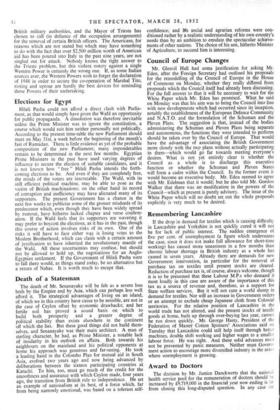Death of a Statesman
The death of Mr. Senanayake will be felt as a severe loss both by the Empire and by Asia, which can perhaps less well afford it. The strategical advantages of living on an island, of which we in this country have cause to be sensible, are not in the case of Ceylon offset by economic drawbacks; and her fertile soil has proved a sound basis on which to build both prosperity and a greater degree of political stability than exists elsewhere in the continent off which she lies. But these good things did not build them- selves, and Senanayake was their main architect. A man of sterling character, he had, as Prime Minister, a notable lack of insularity in his outlook on affairs. Both towards his neighbours on the mainland and his political opponents at home his approach was generous and far-seeing. He took a leading hand in the Colombo Plan for mutual aid in South Asia, evolved two years ago and now being advanced by deliberations between the sixteen participating countries at Karachi. To him, too, must go much of the credit for the smoothness and assurance with which Ceylon made, four years ago, the transition from British rule to independence. He set an example of nationalism at its best, of a force which, far from being narrowly emotional, was based on a tolerant self- confidence; and Ms social and agrarian reforms were con- ditioned rather by a realistic understanding of his own country's needs than by an ambition to emulate the spectacular achieve- ments of other nations. The choice of his son, hitherto Minister of Agriculture, to succeed him is interesting.


































 Previous page
Previous page